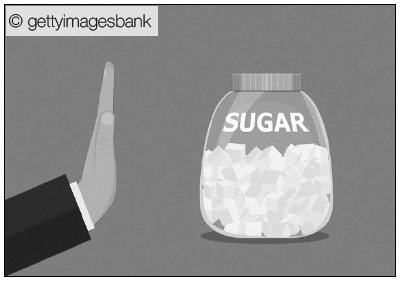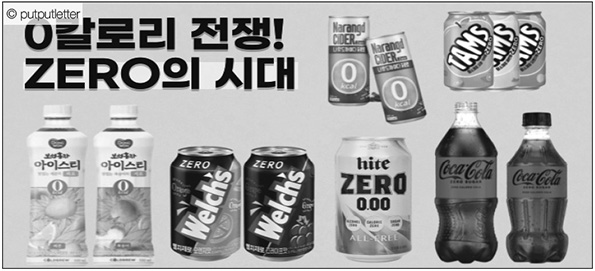
As the interest in diet, food and health increases, there is a phrase that attracts attention. It is Zero Sugar. Zero sugar indicates that a product is sugar-free and unsweetened. Thanks to its popularity, goods ranging from sugar-free snacks such as beverages, snacks, and ice cream to sugar-free alcoholic beverages are being released. Thanks to this, the word “Zero-Sumer” has also emerged, which refers to the MZ generation in their 20s and 30s looking for the Zero label. This seems to be related to the Healthy Pleasure that people pursue. It is the combination of words Healthy and Pleasure that promote sustainable health care by giving pleasure to health care. As an interest in health increases due to the increase in single-person households and the spread of COVID-19, it is gaining popularity among the MZ generation, which values experience, sharing, and fun factors. In other words, sugar-free drinks are more popular because in the past, people used to say, “I do not drink coke or soda at all” to lose weight, but now they are saying “Let’s eat while at the same time taking care of our health.” In fact, in 2022, 343.2 billion USD worth of soda was sold in the world, 18% of which were sugar-free. Soda sold in South Korea in 2022 amounted to 3.81 trillion KRW, 24.9 percent of which were sugar-free while one out of four cans was sugar-free. The global market for alternative sweeteners is growing year by year. Reflecting this, many of the convenience store beverage corners are occupied by Zero drinks, and various sugar-free carbonated drinks such as Coca-Cola Zero, Chilsung Cider Zero, Tams Zero, and Milkis Zero are gaining popularity. Pepsi Zero Lime, which was released in January last year, surpassed 310 million cans in cumulative sales within about a year and a half. In an interview with Long Black, Kim Tae-eon, head of GS Retail’s communication division, said, “Zero is the surest trend right now. Zero drinks are currently filling the vacancy of products with a low turnover in the convenience store industry. The number of related items is multiplying by two to three times every year.” Park Han-sol(Dept. of Environmental Engineering, 21) said, “I tried zero sugar drinks out of curiosity and health concerns, and I plan to continue to consume zero sugar products in the future because they taste very similar to the original.” Therefore, will zero sugar products really help people lose weight without affecting diabetes as it is known?
Zero sugar for diet and health?
First, let’s find out about the artificial sweeteners used in Zero Sugar products. Artificial sweeteners are chemical compounds used to create sweetness instead of sugar, which are hundreds of times stronger than sugar, but unlike sugar, they are not digested and absorbed well in the human body. It hardly raises blood sugar because it does not turn into glucose. In other words, since it cannot be used as calories, it has low or no calories. There are four main types of artificial sweeteners: natural sweeteners, semi-synthetic sweeteners, synthetic sweeteners, and sugar alcohol sweeteners. Natural sweeteners are extracted from nature, and they include Stevia and Grosvener Siraitia. Semi-synthetic sweeteners, like Xylose and Allulose, are also found in nature, but in such low numbers that they are synthesized instead. Synthetic sweeteners, which include Aspartame, Saccharin, Sucralose, and Acesulfame, which do not occur in nature, can only be obtained through synthesis. Sugar alcohols include Xylitol, Erythritol, Sorbitol, Maltitol, etc. At this time, synthetic sweeteners are the most commonly used artificial sweeteners in zero drinks through various combinations.

However, on the May 15, the World Health Organization (WHO) announced new guidelines for artificial sweeteners. It was noted that artificial sweeteners are not effective in controlling weight in the long run, and may actually increase the risk of diabetes or heart disease if consumed for a long time. All artificial sweeteners that are not classified as sugar are targeted, and include Acesulfam Potassium, Aspartame, Cyclamate, Neotame, Saccharin, Sucralose, etc. “Replacing free sugars with non-sugar sweeteners (NSS) does not help with weight control in the long term. People need to consider other ways to reduce free sugars intake, such as consuming food with naturally occurring sugars, like fruit, or unsweetened food and beverages,” said Francesco Branca, WHO Director for Nutrition and Food Safety.
Contrary to the idea that Zero Sugar does not affect diabetes, the Health Insurance Review & Assessment Service revised the answer to “Yes, that is right” to “No” when asked, “Is it true that Zero Coke has nothing to do with diabetes?” They recommend reducing consumption of refined sugar-containing drinks or foods to improve patients’ health, but they said that the use of calorie-free artificial sweeteners instead of sugar has not proven the effect of improving blood sugar or weight loss. The Korean Diabetes Association also added the 2021 Diabetes Care Guidelines on artificial sweeteners, saying, “Artificial sweeteners can help reduce sugar intake in a short period of time, but ultimately patients should reduce not only sugar-containing drinks but also drinks containing artificial sweeteners and replace them with water.”
It is known that artificial sweeteners are helpful for diet because they are not used as calories, but in reality, it is said that eating products containing artificial sweeteners can boost appetite. It is known that artificial sweeteners are helpful for dieting because they are not used as calories, but in reality, it is said that eating products containing artificial sweeteners can boost appetite. According to a Harvard study on diet coke and its effects on the body, the brain feels cognitive dissonance and craving for calories because the body does not respond to certain calories and blood sugar when drinking diet coke. In addition, the paper titled “Nonnutritive Sweeteners and Neural Reward Response in Women and Individuals with Obesity” revealed that when obese women and men drank beverages containing Sucralose, the activity of appetite-related brain areas increased. In particular, hormone levels related to satiety decreased and the craving for carbs increased.
It should be noted that artificial sweeteners do not provide the same level of satisfaction as sugar. In a paper titled “Food Reward in the Absence of Taste Receptor Signaling” published in Neuron, experimental results show that sugar water is more addictive than other foods because of the raising of blood sugar and stimulation of the brain to secrete dopamine. In some cases, artificial sweeteners are sought to stop sugar addiction, which is sweeter when eaten with sugar. Prof. Lee Young-eun in the Dept. of food and nutrition at CBNU said that while it is true that artificial sweeteners contain less or no calories than natural sweeteners, they do not alleviate sugar addiction. In other words, it is more important to solve essential problems than to find the answer in artificial sweeteners.

Zero marketing
Then why do people firmly believe that Zero Sugar products are better? First of all, zero sugar is a representative negative marketing strategy that takes advantage of consumers’ anxiety that the sweetness of sugar is harmful to health. However, the use of artificial sweeteners in zero sugar products does not mean that sugar is not included at all, and there is a possibility that other sugars such as liquid fructose have been added. We should also bear in mind that a moderate use of sugar is essential to our health, since sugar belongs to carbohydrates, an essential nutrient that sustains our life, and is needed to some extent because it is immediately used as an energy source.
Fun zero marketing, which targets most of Zero-Sumer’s people in their 20s and 30s, also had a great influence. An official from Coca-Cola Korea Company said in an interview with Long Black, “Generation Z has overwhelmingly preferred Zero Coke to the original since 2019. However, as the number of competing brands increased every year, the concept and packaging that would stand out to Generation Z were needed. They value unique experiences even if they drink a single drink.” In fact, Coca-Cola attracted a lot of attention by releasing the CM song “Zero” in collaboration with the popular girl group Newjeans. Lotte Chilsung Beverage released a YouTube advertisement featuring the character Saerogumi with the motive of Gumiho (a legendary fox with nine tails) and an advertisement for “Korean Soju Saero 257” using the voice of actor Lee Do-hyun.
Then, what is the health of people who have been drinking artificial sweeteners steadily like? A 10-year study of 100,000 people tracked and observed every six months at the Journal of the American College of Cardiology (JACC) found that people who drank beverages containing artificial sweeteners had more serious cardiovascular complications such as heart attacks and strokes than those who drank only water. It was a study conducted on people who drank a can of beverage every day. Of course, it is highly likely that people who drank artificial sweeteners in the study were not healthy in eating other foods. However, it is also necessary not to think that zero sugar products are healthy or helpful for diet and not to consume them on a dependent basis. There is a constant emphasis in the article as a whole. It is a caution against the “appropriate intake of artificial sweeteners.” Prof. Lee said, “According to the Korea Food Research Institute, the daily intake of artificial sweeteners for Koreans (ADI) is low at 0.1-1.4% of the appropriate amount. However, as the intake of zero-sugar products increases, the intake of one person is increasing. It is desirable to reduce the intake of artificial sweeteners because the WHO recently warned of the risk of artificial sweeteners.”

Kim Ji-soo
sixteen@chungbuk.ac.kr
Park Seo-hyun
psh12183@chungbuk.ac.kr


 All
All Feature
Feature






 Kim Ji-soo
Kim Ji-soo











